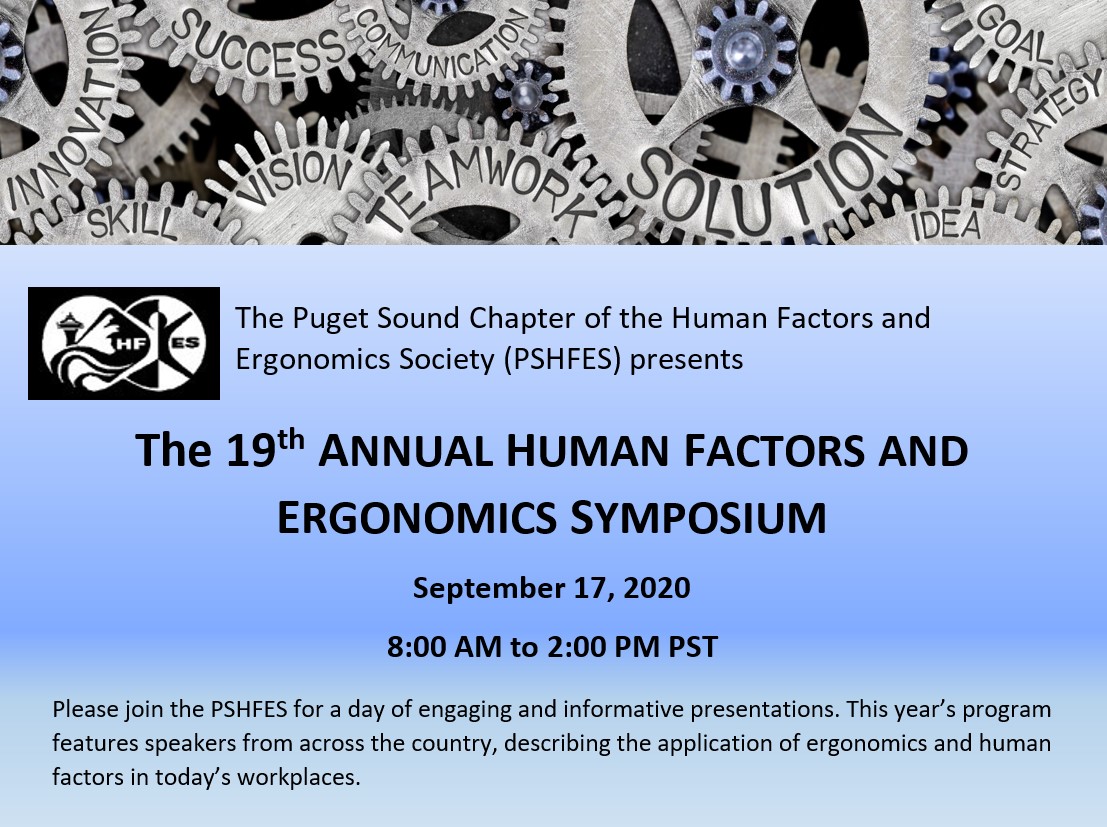- Home
- Events
- Past Symposiums
- Symposium 2020
You must be logged in to access the Member Discount for this Event. Not yet a Member? Click here to Join |
Symposium Presentations
download program Schedule here
A Practical Guide to Home Office Ergonomics Alan Hedge, PhD, CPE, C.HFE Professor Emeritus, Cornell University Most home offices are not set up as ergonomic designs, and consequently those working from home may experience musculoskeletal issues that previously hadn't appeared. This webinar will briefly cover what you need to do to organize your home office so that it is a better ergonomic design that will improve your comfort and reduce any injury risks, and also address sources of stress. Information will be provided on a free app, called Home Office Ergonomics (available in the Apple and Google app stores) that allows you check your setup and gives you lots of tips on how to improve your home office setup. Practical Work System Analysis Associate Professor, Indiana University School of Medicine This talk will briefly define sociotechnical work systems and advance the notion that “human factors is system factors.” Dr. Holden will present, in a practical way, the SEIPS systems model and several practice-oriented SEIPS tools almost anyone can use. Examples from healthcare will illustrate the use of these tools. This presentation will end with thoughts about how systems-oriented professionals can contribute to equity and social justice. Strategies for Automation-Proofing Your Job Ergonomist, Boeing Company Automation (machines or software algorithms) is expected to replace many of the routine, predictable, task components of future worker jobs. By focusing worker skills and training on uniquely human capabilities (e.g., creative thinking to solve unique workplace problems, and human-to-human interaction), workers can stay necessary and valuable - working with automation as a tool, not competing with automation. A suggested strategy for “automation proofing” your job in this way is presented. | Ergonomics and Work-related Musculoskeletal Injuries in Surgeons: The Next Epidemic? Endocrine Surgeon, Associate Professor, University of lowa This lecture will provide an overview of the scope of work-related musculoskeletal disorders among surgeons and surgical trainees. It will also describe some of the contributing and exacerbating factors to these injuries as well as their consequences. Lastly, it will explore potential strategies that may help to improve ergonomics inside and outside the operating room. Designing and Evaluating Fit and Comfort for Virtual Reality Hardware Staff Researcher, Google Inc. In this talk, Dr. Odell will give an overview of the main challenges in designing a comfortable Head Mounted Display. This will include a deep dive into research he led exploring the relationship between headset weight and comfortable wear time. Dr. Odell will conclude with some of the specific experience targets the team used in creating the Google Daydream View, called "the most comfortable VR headset ever created" by Digital trends in 2016. Fatigue Failure as an Etiological Mechanism for Musculoskeletal Disorders Associate Professor, Auburn University Fatigue failure is the mechanism by which materials incur damage when exposed to repeated stress and appears quite relevant to the development of musculoskeletal disorders (MSDs). This presentation will provide evidence that MSDs may result from fatigue failure, and will consider some unique aspects associated with fatigue failure in a complex biological environment (involving self-healing materials). New risk assessment tools based on fatigue failure principles will be discussed. |
Attendees | Sponsors |




